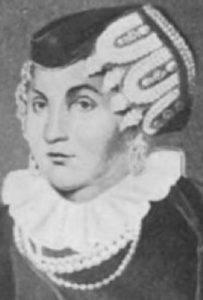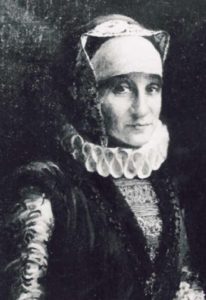Europe’s Greatest Jewish Businesswoman
 Tamar “Temerl” bat Avraham of Opoczno (c. 1765-1830) was born in Poland to a wealthy and deeply religious Jewish family. She married young, but her first husband tragically died soon after. She got remarried to a young businessman named Dov Ber (“Berek”) Zbytkower. He went on to become immensely wealthy, and supplied the Polish and Russian armies. He took on the last name “Sonnenberg”, and was nicknamed the “Polish Rothschild”. Meanwhile, besides being a devoted mother of six children, Temerl was busy supporting the nascent Hasidic movement, founded just a few decades earlier by the Baal Shem Tov. Temerl played a huge role in bringing Hasidism to Poland. In fact, she financed the construction of Warsaw’s first Hasidic synagogue. She paid the salaries of numerous Hasidic rabbis in Poland (along with non-Hasidic rabbis), including the great Simcha Bunim of Peshischa. Temerl was a huge philanthropist and gave to all kinds of other causes as well. In 1818 alone, she donated some 54,000 rubles to Polish charities. After her husband passed away, Temerl took over his business. (In honour of their father, her children changed their last name to “Berekson”, or “Bergson”, which is why she came to be known as Temerl Bergson, too.) She also founded her own new bank. Temerl was one of the top businesswomen in all of Europe at the time. She was so influential that the Russian government gave her special permission to buy an estate, making her only the third Jew to own property outside the ghettos. She continued to do everything she could to assist the plight of the Jews. In 1824, she used her influence to rescind a government decree against Jewish pilgrimages. In fact, some Hasidic leaders came to refer to her as Reb Temerl! (A title traditionally reserved for men.) In her will, she left 300,000 zlotys to charity. Temerl was called the “Polish Hasidah”, and her tombstone states: “To her nation she was a protector against oppression—a helper during distress. To the poor she was a mother. She was a virtuous woman, powerful and famous.” The renowned philosopher and Nobel laureate Henri Bergson was her great-grandson.
Tamar “Temerl” bat Avraham of Opoczno (c. 1765-1830) was born in Poland to a wealthy and deeply religious Jewish family. She married young, but her first husband tragically died soon after. She got remarried to a young businessman named Dov Ber (“Berek”) Zbytkower. He went on to become immensely wealthy, and supplied the Polish and Russian armies. He took on the last name “Sonnenberg”, and was nicknamed the “Polish Rothschild”. Meanwhile, besides being a devoted mother of six children, Temerl was busy supporting the nascent Hasidic movement, founded just a few decades earlier by the Baal Shem Tov. Temerl played a huge role in bringing Hasidism to Poland. In fact, she financed the construction of Warsaw’s first Hasidic synagogue. She paid the salaries of numerous Hasidic rabbis in Poland (along with non-Hasidic rabbis), including the great Simcha Bunim of Peshischa. Temerl was a huge philanthropist and gave to all kinds of other causes as well. In 1818 alone, she donated some 54,000 rubles to Polish charities. After her husband passed away, Temerl took over his business. (In honour of their father, her children changed their last name to “Berekson”, or “Bergson”, which is why she came to be known as Temerl Bergson, too.) She also founded her own new bank. Temerl was one of the top businesswomen in all of Europe at the time. She was so influential that the Russian government gave her special permission to buy an estate, making her only the third Jew to own property outside the ghettos. She continued to do everything she could to assist the plight of the Jews. In 1824, she used her influence to rescind a government decree against Jewish pilgrimages. In fact, some Hasidic leaders came to refer to her as Reb Temerl! (A title traditionally reserved for men.) In her will, she left 300,000 zlotys to charity. Temerl was called the “Polish Hasidah”, and her tombstone states: “To her nation she was a protector against oppression—a helper during distress. To the poor she was a mother. She was a virtuous woman, powerful and famous.” The renowned philosopher and Nobel laureate Henri Bergson was her great-grandson.
Chanukah Begins Sunday Night – Chag Sameach!
18 Incredibly Brave Women in Jewish History
Archaeologists Find 2200-Year-Old Coins Confirming Chanukah
The Peruvian Villager Who Led Hundreds to Convert to Judaism
When Jews & Greeks Were Brothers: The Untold Story of Chanukah
Words of the Week
The Sabbath is the day we focus on the things that have value but not a price, when we neither work nor employ others to do our work, when we neither buy nor sell, in which all manipulation of nature for creative ends is forbidden and all hierarchies of power or wealth are suspended.
– Rabbi Jonathan Sacks

